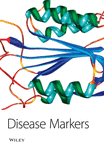Surfactant Protein B Intron 4 Variation in German Patients with COPD and Acute Respiratory Failure
Abstract
Chronic obstructive pulmonary disease (COPD) is a major health problem. Genetic factors that contribute to the disease have been postulated. The pulmonary surfactant protein B (SP-B), which is essential for normal lung function, is considered as a candidate gene for COPD in this case-control study. We studied the SP-B intron 4 size variants in 346 individuals. This group consisted of 118 patients with chronic bronchitis or COPD, including 24 patients with acute respiratory failure (ARF) in COPD, 118 matched controls without pulmonary disease and 110 healthy individuals (population control). The frequency of intron 4 variants was similar in either control group (10.9%, 14.4% respectively), with a small increase in the COPD group (18.6%). This increase was due to a high increase of intron 4 variants in the ARF subgroup (37.5%, p = 0.003, OR 4.9, 95% CI: 1.76–13.6). The data indicate that SP-B intron 4 variants may associate with increased risk of ARF in COPD and may be used as a marker of susceptibility in this disease subgroup.




